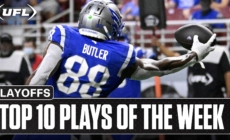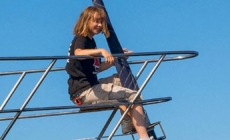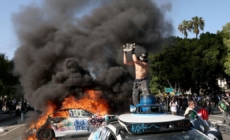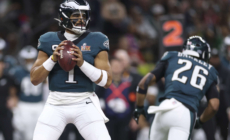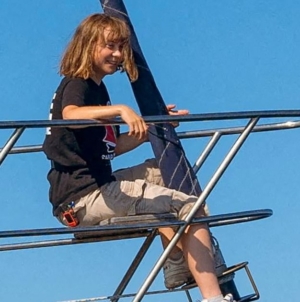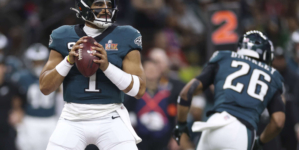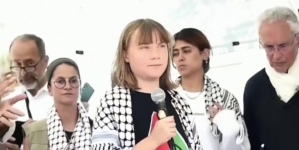-
UFL Top 10 Plays from Conference Championships | United Football League - 8 mins ago
-
Israeli forces board charity boat bound for Gaza with activist Greta Thunberg aboard - 11 mins ago
-
Tom Brady Doesn’t Hold Back About Chiefs’ Patrick Mahomes - 27 mins ago
-
2025 UEFA Nations League Finals: Portugal's trophy ceremony following victory over Spain - 54 mins ago
-
Waymo vehicles set on fire in downtown L.A, as protesters, police clash - 59 mins ago
-
Eagles’ Jalen Hurts, Saquon Barkley Labeled MVP Sleepers - about 1 hour ago
-
George Clooney returns to silver fox look for 2025 Tony Awards ceremony - about 1 hour ago
-
Denny Hamlin wins Michigan, taunts crowd while awaiting third child - 2 hours ago
-
Kamala Harris Says LA Protest ‘Overwhelmingly Peaceful’ Calls Trump ‘Cruel’ - 2 hours ago
-
Israel threatens aid boat heading to Gaza carrying Greta Thunberg - 2 hours ago
You Can Now Bet on Wildfire Containment. Is That Such a Good Idea?
When parts of Los Angeles became engulfed in deadly wildfires last week, many of the people watching neighborhoods burn to the ground rushed to find ways to support residents who had been evacuated or had lost their homes.
Others placed bets.
Users on Polymarket, a crypto-based prediction market that gained attention during the presidential campaign, put money on predictions like, “How many acres will Palisades wildfire burn in total?” and “When will the Palisades wildfire be fully contained?” As of Tuesday, bettors give the flames a 51 percent chance of being contained before February. More than half a million dollars have been placed on four markets predicting the duration and size of the fires.
The gamification of wildfire containment has raised ethical questions about a system that could, in theory, offers gamblers a perverse incentive to find ways to prolong the devastation in order to win their bets.
Justin Sullivan/Getty Images
“I’m in favor of prediction markets, but we need to recognize the potential for dangerous incentives when they involve high-stakes events like fires, terrorist attacks, or other critical incidents,” Nathanael Fast, director of the USC Neely Center for Ethical Leadership and Decision Making, told Newsweek on Monday.
“Imagine someone deep in gambling debt placing a large bet on a fire spreading to a nearby area and then deliberately starting a fire to ensure that outcome.”
To be sure, there is no indication that such a scenario has ever happened, but it raises the question given the skyrocketing popularity of such markets, where people place bets on everything from elections to sports to natural disasters.
While the origins of the Palisades and Eaton fires remain under investigation, at least one person has been accused of stoking new fires. As of midday Tuesday, the Palisades Fire, which has burned more than 23,700 acres around the Pacific Palisades neighborhood, is about 17 percent contained, while the Eaton Fire, which has scorched more than 14,000 acres in the Altadena area, remains 35 percent contained, CAL FIRE data shows.
Mark V. Jones, who lost his Altadena home in the Eaton Fire, told Newsweek he was deeply troubled by wildfire-related gambling.
“I think it’s despicable,” Jones, 61, said Tuesday. “People will find anything to gamble on, but something like that, you would like to think that people wouldn’t stoop so low to bet on someone else’s demise.”
Jones, an independent contractor who has lived in Altadena since 1973, lost nearly all of his tools during the fast-moving blaze, as well as the two-bedroom home he previously rented on Palm Street.
“Betting on something like that?” Jones said of wildfire-related gambling. “I’m just like, ‘Wow, you could think of something else to gamble on.’ But that’s just what bettors do —find things to bet on. It doesn’t matter what it is.”
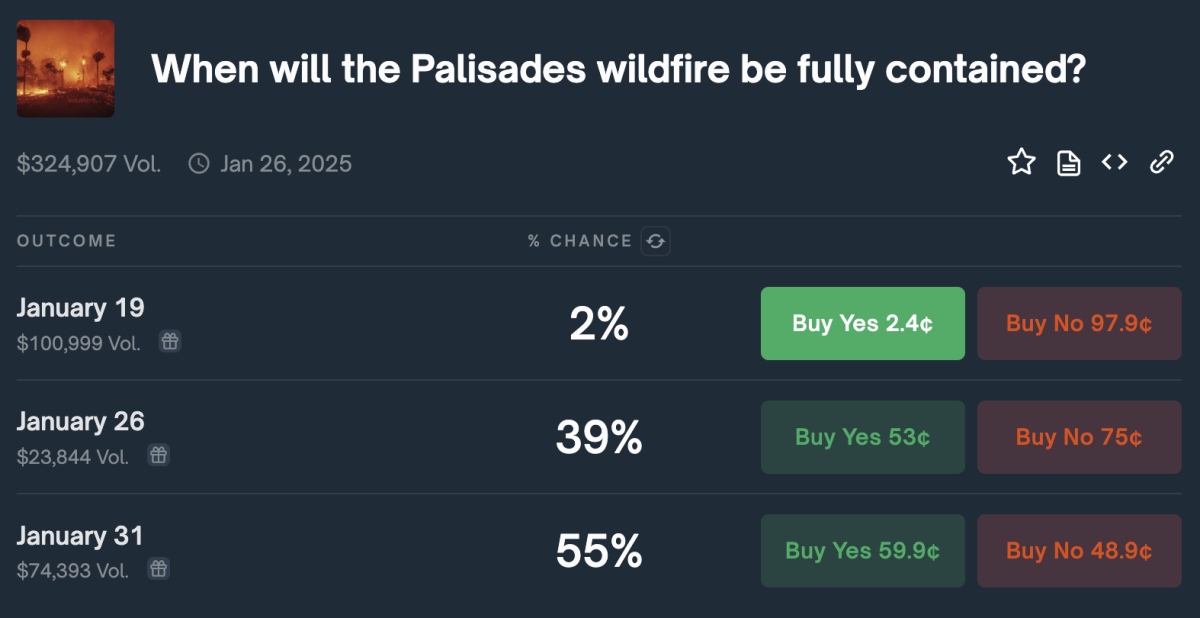
Polymarket
Newsweek reached out to Polymarket via email for comment.
Polymarket has been technically off-limits to American consumers for the last three years as the result of a settlement with the U.S. Commodity Futures Trading Commission, but users in the U.S. can still place bets if they subvert those restrictions with a virtual private network (VPN), a loophole for which countless step-by-step guides exist online.
“It is quite easy to access the platform using various workarounds like VPNs,” Fast said.
While he believes disqualifying Americans from making bets on certain events or disasters happening in the U.S. is a step in the right direction, Fast questioned the role American actors could still be playing in these markets, even if they’re not the person placing the wagers.
“How would someone halfway across the world have useful insights about whether a fire is going to spread from the Palisades to Santa Monica? Where is their supposed expert information coming from?” he asked.
Polymarket has defended the wildfire-related predictions, insisting that their markets “address the same questions being discussed across cable news and X.”
“We’ve proven that prediction markets can be an invaluable alternative information source for those seeking real-time quantitative data,” a Polymarket spokesperson said in a statement to the Los Angeles Times.
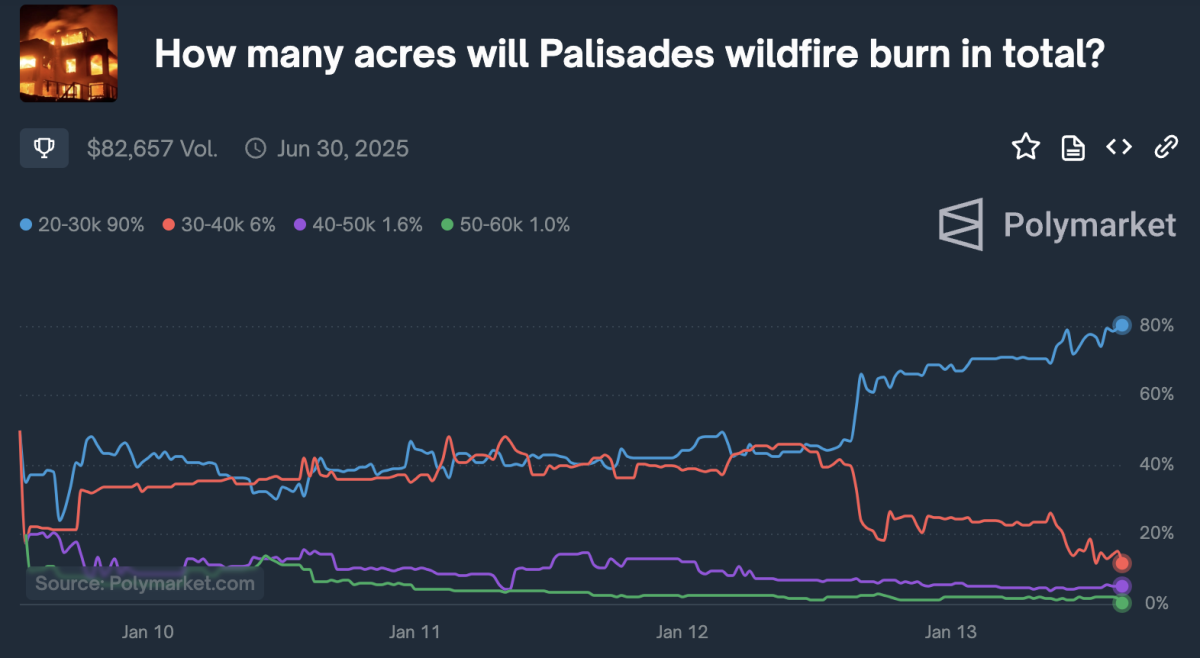
Polymarket
Above each of Polymarket’s wildfire markets is a note that reads, “The promise of prediction markets is to harness the wisdom of the crowd to create accurate, unbiased forecasts for the most important events impacting society. The devastating Pacific Palisades fire is one such event, for which Polymarket can yield invaluable real-time answers to those directly impacted in ways traditional media cannot.”
But the jury is still out on Polymarket’s assertion that its markets are valuable and reliable sources of information. While the platform’s users accurately predicted that Trump would win the election, the odds would often change based on a few deep-pocketed traders — or “whales” — placing large bets, leading to questions about the market’s reliability and volatility.
Lia Nower, the director of Rutgers University’s Center for Gabling Studies, told Newsweek that even as gambling has become ubiquitous in America, these prediction markets once again lead the U.S. into unchartered waters based on an evolving regulatory environment that varies by jurisdiction.
“In states that allow prop bets, you can bet on virtually anything,” Nower said. “There are people who will get into gambling debt betting on props just like other types of bets, and people who get desperate and do things that are out of character when they lose.”
“I would assume if you can bet on fires, then someone might start one to win a bet,” she said.
Nower’s center is one of only a few gambling studies programs in the U.S., where fears of widespread gambling addiction have exploded since the Supreme Court’s landmark 2018 decision that allowed states to legalize sports betting. Last year alone, Americans are estimated to have wagered some $150 billion on sports, a $30 billion increase from 2023.
Then, for the first time in U.S. history, betting on elections was cleared by a U.S. appeals court in October, paving the way for gamblers to have a financial stake in the outcome of the 2024 presidential election using regulated exchanges like Kalshi, which recently hired Donald Trump Jr. in an advisory role.
Analyses show that Polymarket, which was not covered by the appellate court decision, brought in over $3.6 billion in bets on the White House race, with $1.5 billion wagered on Donald Trump and $1 billion on Vice President Kamala Harris.
In the wake of the devastation in Los Angeles, gamblers on Polymarket have also make bets on the politics of the fires. With both California Governor Gavin Newsom and Los Angeles Mayor Karen Bass in a fight for their political lives, the markets currently give Newsom an eight percent chance of being recalled and Bass a 17 percent chance of being removed from office by April.
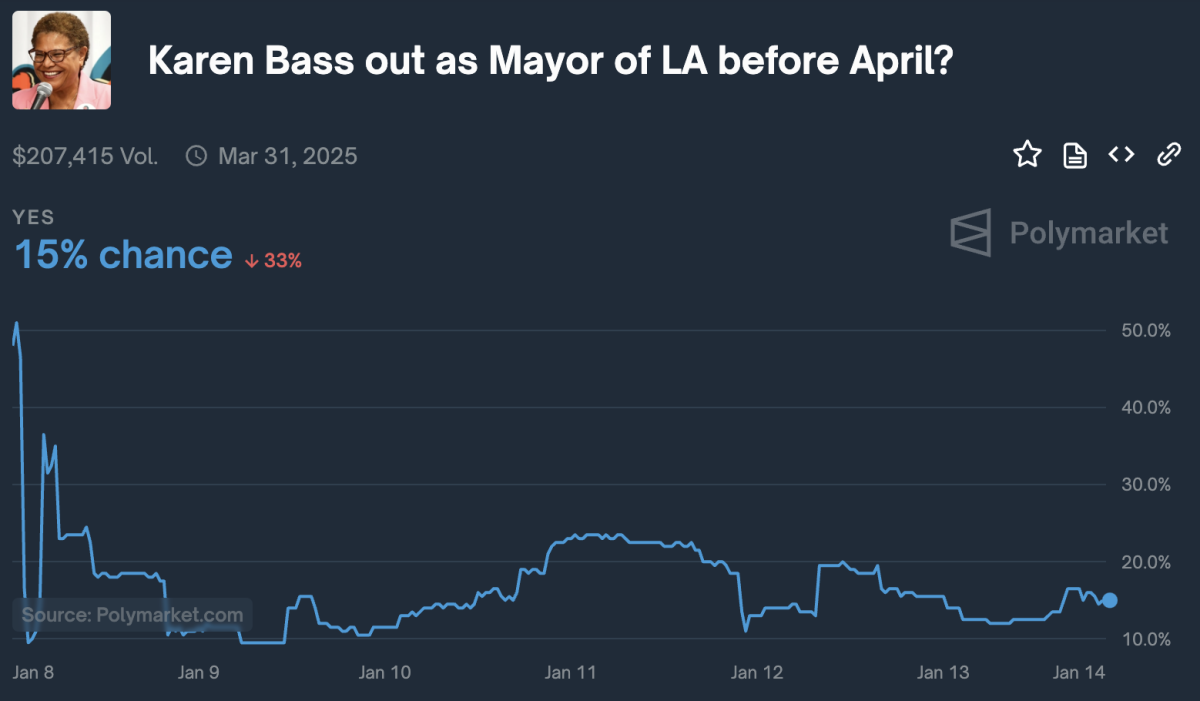
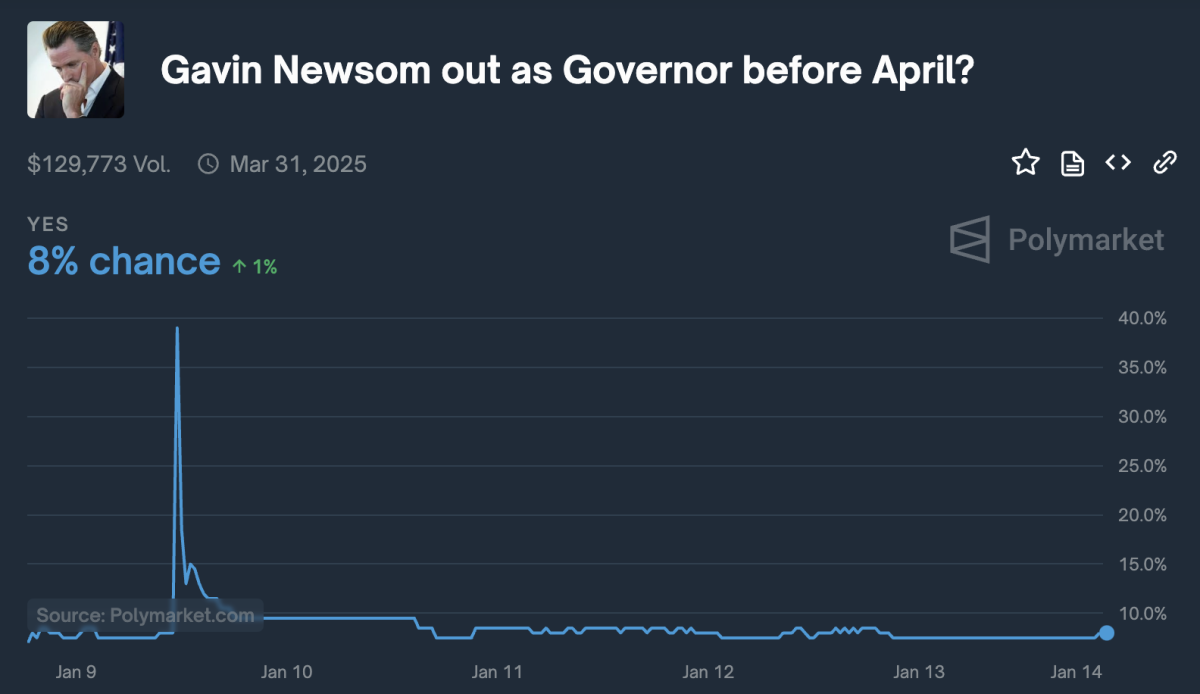
Polymarket
More than half of Americans, 55 percent, said they had participated in some kind of gambling over the past year, according to an August survey released by the American Gaming Association. In the third quarter of 2024, the commercial gaming industry brought in nearly $18 billion in revenue — its 15th consecutive quarter of growth.
Jones, who lost his home in the fires, said he found attempts to monetize the infernos, including placing bets on when the blazes will be fully contained, to be in poor taste.
“I don’t think that’s a great thing to do,” he said.
Jones estimated roughly 60 to 70 percent of residents in Altadena, a city of roughly 42,000 residents, had been displaced over the last week. An online fundraiser organized for Jones, meanwhile, has eclipsed $23,000 as of Tuesday.
On Monday, American gambling company FanDuel announced it was donating $250,000 to Americares and the Los Angeles Fire Department Foundation, “in support of wildfire relief efforts throughout impacted communities in the greater Los Angeles area.”
“FanDuel and Flutter have been proud members of the Los Angeles business community for over two decades. We are heartbroken by the devastating loss these wildfires have created in a community we call home,” FanDuel CEO Amy Howe said in a statement. “We are committed to ensuring our employees are safe and making sure the community has the resources it needs to support the heroic efforts of our first responders.”
Polymarket has not made any statement indicating similar actions. The perdition market did not respond to Newsweek‘s request for comment asking if an announcement like FanDuel’s would follow.
Source link
